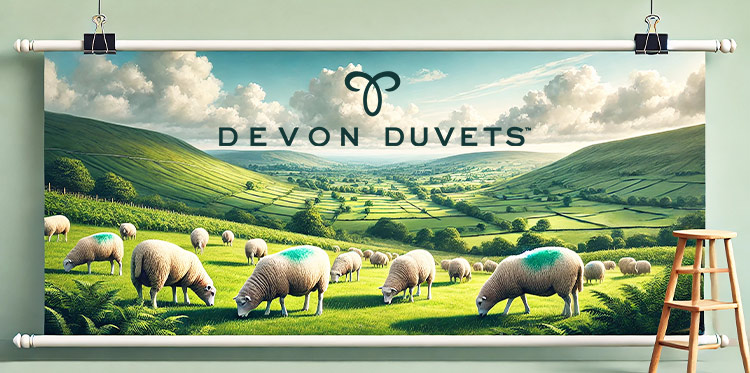Why We Must Cherish UK Farmers

Sheep Farming and Sustainable Wool
At Devon Duvets, we are passionate about crafting natural, 100% sustainable products, particularly using British wool. Behind each duvet lies a rich story of British sheep farming—an industry crucial to our rural communities and the preservation of our landscape. In this blog, we’ll explore why supporting UK sheep farmers is more important than ever, how the UK Government and trade deals impact their future, and how you can make a difference.
The Decline of Sheep Farming in the UK
Over the past ten years, sheep farming has faced a steep decline. Since the 1980s, the number of sheep farmers has fallen by 50% from 90,000 to 45,000, with only 34,000 full-time farmers remaining in the UK. These small family farms are the backbone of the agricultural industry, contributing £1.8 billion annually and supporting 120,000 jobs.
However, many farmers are facing challenges, including the impacts of post-Brexit changes, EU subsidies, and evolving trade deals. The National Farmers Union warns that UK sheep farmers are disappearing. Without the strong voice of small-scale farmers and adequate government support, we risk losing an essential part of our national heritage.


The Importance of Sheep Grazing
Sheep grazing plays a vital role in maintaining the British landscape. Sheep not only manage the natural vegetation and promote biodiversity but also act as natural "mowers," keeping ecosystems balanced. Managed grazing prevents overgrowth, making space for other wildlife to thrive and ensuring that the land remains a viable carbon sink.
Without this balance, large areas of the countryside would become overgrown, leading to the decline of both biodiversity and the cherished aesthetics of the British landscape. Rural communities would suffer as small family farms and smaller farms fold under financial pressures.


British Wool: A Heritage to Protect
British wool is an eco-friendly, renewable resource. Unlike synthetic fibres, wool is biodegradable, temperature-regulating, and antibacterial. By choosing British wool products like Devon Duvets, you're supporting small-scale farmers, preserving our heritage, and ensuring the sheep population thrives.
The decline of sheep farming threatens not just jobs but a tradition that has sustained rural communities for centuries. The Common Agricultural Policy from the European Union previously offered some relief to sheep farmers, but with post-Brexit trade deals still uncertain, the sector faces an unpredictable future.


The Role of the UK Government
The UK Government has a critical role in safeguarding the future of farming. Ensuring that agriculture remains viable for small family farms is not just about economics; it’s about sustaining the lifeblood of our rural communities. While many farmers continue to produce essential products like wool, meat, and dairy, they require better support and funding to combat rising operational costs. Without action, we risk a future where the UK’s countryside is only a memory on canvas.


What Can You Do?
Supporting UK sheep farmers is easier than you think. By purchasing British wool products, you are directly contributing to the survival of this vital industry. Whether it’s choosing British lamb at your local butcher, opting for woollen products, or supporting local farmers markets, every small action counts.
The value of sheep farming extends far beyond wool production. The sector also produces meat for the UK’s food industry. Sheep meat, including lamb and ewes, remains a staple for British families. Smaller farms often rely on diversified products, from sheep grazing land to cattle farming, to survive.


The Future of British Farming
Looking ahead, the future of British farming, particularly in sheep, will require ongoing adaptations. While farming has been the foundation of British life for centuries, today’s farmers must balance traditional practices with modern innovations in sustainable farming.
Smaller farms, especially those on hills or in less fertile regions, face even more difficulties. These farms often serve as the first line of defence for our environment, reducing soil erosion and ensuring that natural vegetation thrives. However, without proper compensation from the UK Government and the market, the economic strain could lead to the disappearance of many small-scale farmers.


By supporting British wool, you help secure the future of UK farmers and ensure that our landscapes remain diverse, rich in biodiversity, and sustainable. Don’t let sheep farming become just a distant memory. Together, we can support the livelihoods of these farmers and preserve the heart of our countryside.




